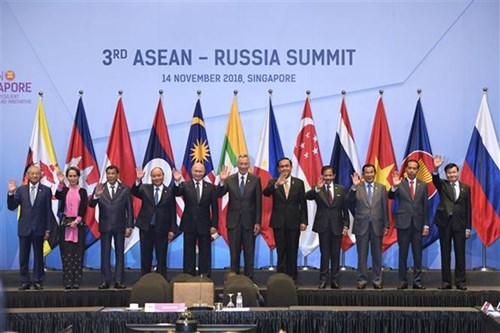Prime Minister Nguyen Xuan Phuc, other ASEAN leaders, Russian President Vladimir Putin attended the summit, which is part of the 33th ASEAN Summit and related meetings.
The ASEAN countries lauded Russia for promoting its responsible and active role to contribute to peace, stability and cooperation for mutual development in the region and effectively respond to newly emerging challenges.
    |
 |
|
ASEAN leaders and Russian President Vladimir Putin (fifth from left) at the 3rd ASEAN-Russia Summit held in Singapore on November 14 |
They expected that Russia would continue supporting the central role of the bloc and actively get involved in the efforts to foster dialogues, cooperation, trust-building, international law compliance, and common norms of conduct via mechanisms headed by ASEAN.
The two sides agreed to bolster their cooperation in trade, investment, science, technology, agriculture, energy, national disaster and calamity response, healthcare, education, counter-transnational crime, and information technology security, and others. They adopted a statement on cooperation in security.
President Putin welcomed the upgrade of Russia-ASEAN ties to strategic partnership on the basis of mutual respect and mutually beneficial cooperation for peace, stability and cooperation for mutual development in the region.
He said Russia agrees to step up all-faceted cooperation with ASEAN in its strong fields which draw ASEAN’s interests, and supports connectivity and strengthened economic ties with ASEAN and between the bloc and the Eurasian Economic Union.
Prime Minister Nguyen Xuan Phuc said the ASEAN-Russia strategic partnership will help boost practical and efficient cooperation in responding to traditional and non-traditional security challenges that threaten security and stability in the region while pushing the implementation of road-maps and comprehensive frameworks pertaining to trade and investment.
He expressed his hope that Russia supports the standpoint and principles of ASEAN in safeguarding peace, and stability in the East Sea (South China Sea), addressing peacefully disputes based on international law, exercising self-restraint, avoiding complicating the situation, fully implementing DOC, and negotiating COC in a practical and efficient manner.
Source: VNA